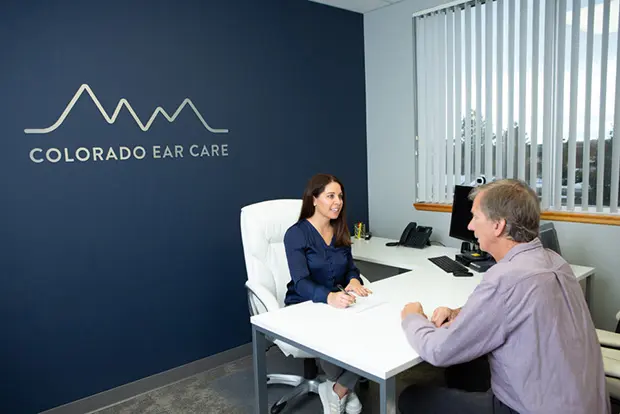Concerned about your hearing? Don’t delay!
Whether you’re concerned about your hearing or a loved one’s, the sooner you seek support from a professional, the better.
At Colorado Ear Care, our focus has always been to give our patients the best possible service, the most comprehensive testing, and the personalized recommendations they deserve to feel confident and empowered about their hearing care choices.
Still, the need for hearing care can be a daunting one, which is why we make patient education a central part of our service offerings.
We know you have a lot of questions about hearing loss, so we’ve taken some of the most popular questions asked online, and provided you with the expert-driven answers that you deserve.
How is hearing loss diagnosed?
At Colorado Ear Care, we take a patient-first approach. This means that before we do anything related to the actual testing of your hearing, we get an understanding of your case history.
This is essentially an interview where we get to know you, your lifestyle, and the experiences you’ve been having that have led you to our practice. Some questions will include:
- How long do you believe you have been experiencing hearing loss?
- Where do you find hearing most difficult?
- Do you have a history of noise exposure in your personal or professional life?
- Do you ever experience ringing, buzzing, or pulsing sounds in your ears?
- Do you also experience dizziness or balance issues?
Once we have a clearer sense of your case history, we’ll move onto hearing testing, which we break up into three distinct parts.
What are hearing tests like?
First, we’ll look to see if you’re experiencing any “mechanical issues” with your hearing. This means that we’ll examine your ears to make certain that your hearing issues aren’t related to a buildup of wax or debris.
If we do find significant buildup, we can clean your ears, which can often improve your hearing experience.
After making sure that wax and debris aren’t an issue, we’ll use a tool called a tympanometer to test how well your eardrum and middle ear bones are working. And no need to worry, this is a painless test!
Secondly, we’ll measure the sensitivity of your hearing. We do this by having you sit in a special soundproof booth, designed specifically for hearing tests. While you’re in the booth, you’ll wear professional-grade headphones while we play several tones at strategically placed volumes and frequencies.
This test will tell us what frequencies you might be having difficulty hearing, as well as the specific volumes where this loss might be occurring.
Next, we’ll administer what’s called a speech understanding test. This test will help us understand how well you understand speech sounds, where you might be having trouble, and at what volume sounds should be in order for you to better understand them.
What happens after hearing testing is complete?
All of these tests are critical in determining the nature of your hearing loss, as well as whether or not your hearing loss would benefit from hearing aids.
If your hearing loss requires medical intervention, we can refer you to an otolaryngologist — a doctor who specializes in the ear, nose, and throat — or to your primary care physician, so your hearing can get the medically necessary care it needs.
For hearing loss that would benefit from hearing technology, we’ll use a combination of your test results and the information that you shared about your lifestyle in order to recommend hearing aids that will provide you the best possible support.
Why is it important to seek hearing loss treatment?
For many, hearing loss is a progressive condition. Most don’t even realize that they’re experiencing hearing loss at first, and because of this treatment will often be delayed and hearing loss will worsen over time.
As hearing loss worsens, our brains have to work harder in order to interpret sounds. This can lead to feelings of exhaustion and fatigue. Some, due to the difficulties that hearing in noisy situations can pose, find themselves pulling away from social situations, which can then lead to feelings of depression and isolation.
Isolating oneself from social situations can cause hearing loss to worsen, as our brains are experiencing and processing even fewer sounds.
This is why we recommend that individuals over the age of 55 see a hearing care expert on an annual basis. 55 is the approximate age where a person’s hearing can naturally start to degrade, and the sooner that a professional can observe a person’s hearing loss, the sooner we can make recommendations designed to protect and preserve your hearing health.
Great hearing care starts with a provider you can trust
It’s true. One of the key factors in having a more successful hearing care experience is by working closely with a hearing professional you can trust. It’s the difference between getting an out of the box solution and receiving personalized care tailored to your specific needs.
At Colorado Ear Care, our commitment is to always deliver what’s best for you and your unique situation. If you believe you or a loved one are in need of hearing care, don’t delay! Contact Colorado Ear Care today for your appointment!

